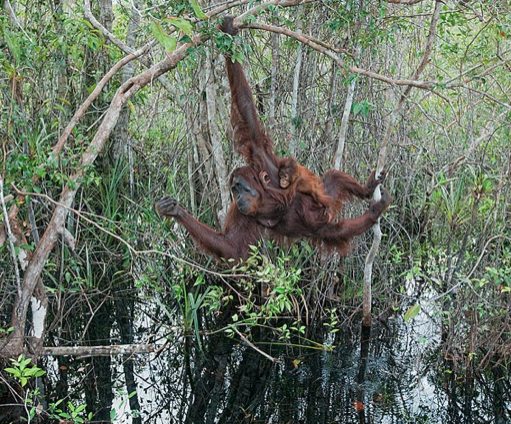While Monkeys Attack Indonesian Village, It’s Really Apes That Are Under Dire Threat From Humans

A mob of wild monkeys attacked a village in Indonesia this week and injured seven people, one critically. But the bigger story is the reverse.
The Jakarta Post reported that the violent simians – reportedly a troop of 10 -- targeted residents in the town of Toddang Pulu in Sidenreng Rappang District, South Sulawesi.
The Associated Press reported a “surprise attack” with monkeys biting the people at random.
A local official told the Post that the primates entered the village on Monday night and broke into people’s homes, causing widespread panic. He denied allegations that the animals had been forced out of their natural jungle habitat by local human residents, although he noted that the indigenous To Lotang people still use the forest to hold rituals.
The Daily Mail reported that the monkeys' behavior is strange because they are usually afraid of humans and flee at the very sound of human voices.
It is not clear what kind of monkeys were involved in the attack, but many primates on the vast archipelago of Indonesia are endangered by the expansion of human settlements, the gradual destruction of natural habitats and other factors.
According to the book "Indonesian Primates" by Sharon Gursky and Jatna Supriatna, Indonesia boasts one of the largest primate populations in the world, with more than 33 species.
The orangutan is perhaps the most well-known ape that is facing extinction in Indonesia.
The United Nations reported that fewer than 6,600 Sumatran orangutans remain in the wild, down from an estimated 85,000 in 1900, partly due to human incursions into their habitats.
“Nearly half of Sumatra’s forests disappeared between 1985 and 2007, and in the last decade, close to 80 percent of the deforestation in the peat-lands was driven by the expansion of oil palm plantations, while over 20 percent was due to other uses, such as candlenut or coffee production,” the UN stated.
Illegal fires – often set on purpose by palm oil companies to clear out land -- also threaten Indonesia’s great apes, particularly the orangutans of northern Sumatra, which has the world’s densest population of the ape.
“Despite all these words and statements and speeches about conserving orangutans and peat-lands and reducing carbon emissions … the evidence is there has been no change,'' said Ian Singleton, the director of conservation at the Sumatran Orangutan Conservation Program, according to the Sydney Morning Herald.
Orangutans are also under dire threat in Kalimantan, the Indonesian part of Borneo, due to illegal logging.
According to 4Apes.com, up to 1,800 orangutans were killed by humans in Kalimantan in 2010 alone and in the past as many as 3,100 of the beasts may have been killed annually.
“These killing rates are higher than previously thought and are high enough to pose a serious threat to the continued existence of orangutans in Kalimantan,” the group stated.
International Animal Rescue warned that primates in Indonesia and across other parts of Asia are also endangered by the illegal trade in bushmeat as well as trafficking.
“The illegal trade in primates in Indonesia inflicts terrible suffering on animals that are caught from the wild and sold as pets in the animal markets,” IAR stated.
© Copyright IBTimes 2024. All rights reserved.





















